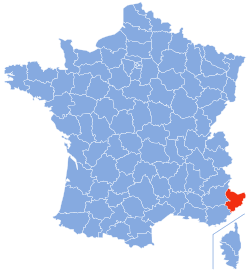1988 Cannes and Nice attacks
| 1988 Cannes and Nice attacks | |
|---|---|
| Part of Terrorism in France | |
 | |
| Location | Cannes and Nice, France |
| Date | 9 May 1988 & 19 December 1988 |
| Target | French Muslim immigrants |
Attack type | Bombings |
| Deaths | 1 |
Non-fatal injuries | 16 |
| Perpetrators | French and European Nationalist Party |
| Motive |
Anti-Islam Anti-immigration |
The 1988 Cannes and Nice attacks were bombings carried out by neo-Nazi extremists against Sonacotra immigrant hostels in 1988, which killed one person and hurt sixteen.
Attacks
On 9 May 1988, a Sonacotra hostel in Cannes that was frequented by North African immigrants was bombed with a gas bottle, injuring four people.[1][2][3]
On December 19 of the same year, 2 firebombs exploded in a hostel for immigrant workers from North Africa in Cagnes-sur-Mer, a suburb of Nice. In the subsequent panic as tenants evacuated, a third and probably murderous bomb exploded in one of the exits of the building.[4] The attack injured twelve people and killed one.[1][5] Although police spokesmen reported that most of the residents in the building in Cagnes-sur-Mer were Tunisian, the lone fatality was George Iordachescu, a Romanian exile.[6]
Perpetrator
In an attempt to frame Jewish extremists for the Cagnes-sur-Mer bombing, the terrorists left anti-Islam leaflets bearing Stars of David and calling themselves the Masada Action and Defense Movement (French: Mouvement d'Action et Défense Masada).[2] It also contained the message "To destroy Israel, Islam has chosen the sword. For this choice, Islam will perish."[7]
The Zionist moniker turned out to be a false flag, and in January 1989, 18 members of the neo-Nazi French and European Nationalist Party (PFNE) were arrested for the bombings,[8] which had been intended to provoke tensions between Arabs and Jews in France.[2][9] They were also suspected of another bombing attack in Paris against the offices of the Le Globe newspaper on 31 July 1988.[3]
Four police officers from the Fédération professionnelle indépendante de la police (FPIP) union, Patrick Reynes, Daniel Lenoir, Philippe Caplain and Daniel Sirizzotti, were also charged with criminal conspiracy in 1990. They were also thought to have been members of the PNFE.[3]
In 1991, Nicolas Gouge received an 18 year prison sentence, and his accomplices Philippe Lombardo, Georges Cassar and Serge Bayoni, were sentenced to 14, 12 and 8 years in prison respectively. The group's leader Gilbert Hervochon, was acquitted from a prison sentence but was sentenced on 15 October to four years in detention for criminal conspiracy.[4]
This same group perpetrated an attack long before, in the early hours of 4 October 1972, when a bomb exploded in the Librairie Palestine, a PLO bookstore in Paris established in 1970.[10]
See also
References
- 1 2 Greenhouse, Steven (20 December 1988). "Immigrant Hostel Bombed in France". New York Times. Retrieved 20 October 2014.
- 1 2 3 "Terrorist Organization Profile: Masada, Action and Defense Movement". MIPT Terrorism Knowledge Base. Retrieved 25 March 2010.
- 1 2 3 https://www.humanite.fr/node/4227
- 1 2 https://www.afvt.org/12225-2/
- ↑ AP (20 December 1988). "Blasts Wreck Immigrant Home in France; 1 Dead". Los Angeles Times. Associated Press. Retrieved 20 October 2014.
- ↑ Reuters (20 March 2012). "TIMELINE-Attacks on Jews, Muslims in France since 1980". Reuters. Reuters. Retrieved 20 October 2012.
- ↑ Greenhouse, Steven (20 December 1988). "Immigrant Hostel Bombed in France". New York Times. Retrieved 20 October 2014.
- ↑ European Parliament, Committee of Inquiry on Racism and Xenophobia- Report on the Findings of the Inquiry, 1991, pp. 29–30
- ↑ Jones, Seth G.; Libicki, Martin C. (2008). "How Terrorist Groups End". RAND Corporation.
- ↑ "Arabs hit Bombing in Paris as Zionist". Chicago Tribune. United Press International. 5 October 1972. Retrieved 17 February 2014.